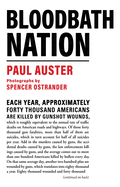
So much has been written about gun violence in the U.S., a country that buries 40,000 of its own as a result of gunshot wounds each year, that it's fair to question whether there could be a new way to look at the problem. Taking a crack at it is Paul Auster (The New York Trilogy; Report from the Interior), whose Bloodbath Nation is deft and dogged and entirely too contemplative to be a screed, even at its febrile peak.
The book is a multipart essay chronicling the nation's fixation with guns. Accounts of Auster's personal experience with guns merge with sociological observations and a partial inventory of mass shootings in the U.S. He is sparing with his vitriol, largely reserving it for gun culture. And yet, throughout the book, Auster seems to be not so much in a state of rage as genuine perplexity. About the only-good-guys-with-guns-can-stop-bad-guys-with-guns argument, he writes in what seems like true puzzlement, "If the problem is too many bad men with guns, would it not be wiser to take those guns away from them rather than arm the so-called good men, who in many if not most instances are considerably less than good, and thereby eliminate the problem altogether, for if the bad men had no guns, why would the good men need them?"
Furthermore, Bloodbath Nation includes several dozen black-and-white photographs by previous Auster collaborator Spencer Ostrander, who has visited many of the sites of mass shootings in the U.S. since 2003. The buildings, shops and restaurants cluster moment-of-silence-like between chapters and embody a feeling that Auster notes is commonly shared by shooters: loneliness. --Nell Beram, author and freelance writer

